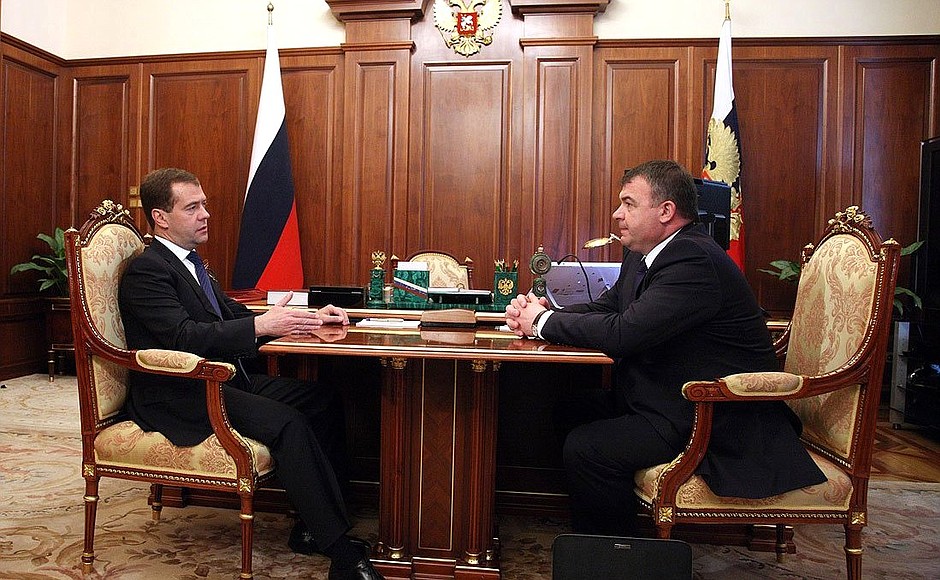
Minister Serdyukov explained how at 8 am on May 5 the Marshal Shaposhnikov anti-submarine destroyer received news of the tanker's hijacking and headed to its rescue. After a reconnaissance tour by a helicopter between midnight and 1 am on May 6, the destroyer approached the oil tanker. At 5:20 this morning Russian forces stormed the tanker and completely liberated it by 6 am. All members of the tanker's crew and the boarding team are alive and well.
The President commended the professionalism of the boarding team and ordered Mr Serdyukov to prepare a ceremony for rewarding participants in the operation to free the tanker.
During the working meeting President Medvedev stressed the necessity of developing an international legal framework for combating piracy and noted that he has repeatedly raised this issue at international summits, including at the recent Washington [nuclear security] summit. Soon he will commission the Russian ministries of Defence and Foreign Affairs to work further on this issue.
The Moscow University tanker, sailing under the Liberian flag with a cargo of crude oil from Sudan to China, was captured on May 5 in the Arabian Sea off the coast of Somalia. The crew composed of 23 Russians was at the mercy of the pirates. In the morning of May 6, the marines of the Marshal Shaposhnikov anti-submarine destroyer conducted an operation to free the vessel.
* * *
President of Russia Dmitry Medvedev: Mr Serdyukov, I instructed you to handle the hijacking of the Moscow University tanker. An operation was carried out with good results. Please tell me about what was done.
Defence Minister Anatoly Serdyukov: On May 5, at 8 o’clock in the morning, the Marshal Shaposhnikov anti-submarine destroyer received a signal of the Moscow University tanker hijacking. At 8:25, it headed to the tanker’s rescue. On May 6, today at midnight, it stopped within an 80-mile zone of the tanker and sent a K-27 helicopter on a reconnaissance mission.
Dmitry Medvedev: You called me at one o’clock in the morning and told me that it had flown around and made observations.
Anatoly Serdyukov: The helicopter needed to establish whether this was the correct vessel; this was occurring at night. When the helicopter approached, guns were fired from the tanker. The helicopter retaliated and then returned. By 2:30 the Marshal Shaposhnikov approached within 1.5 kilometres of the vessel.
Dmitry Medvedev: This was after one in the morning.
Anatoly Serdyukov: That’s right, it was by the time the helicopter returned. The Marshal Shaposhnikov approached the tanker at 5 o’clock. Assault groups had been assembled by then, and at 5:20, they stormed the tanker. Within twenty minutes, the pirates were forced to surrender. This liberation resulted in several casualties among the pirates. There were no casualties among the tanker’s crew or assault teams. At 6:00, the vessel was fully liberated.
Dmitry Medvedev: Great job. Their actions were very precise.
First of all, I would like you to prepare a recommendation to award everyone who participated in this rapid, precise, professional liberation of the tanker. Incidentally, as we discussed over the phone, it is good that the forces did not act at night, because that would have been risky. This way, in daylight, they did everything very accurately and very well.
Second, we will need to work on an international legal framework to combat piracy; I will once again give instructions to you and the Foreign Minister. I last spoke about this issue in Washington with my colleagues at the Nuclear Security Summit. The problem is that everyone agrees that piracy is evil, but they just cannot agree on how to fight it, saying we do not need to establish any new courts as we already have everything we need. But at the end, the situation is very bad as far as legal and political mechanisms are concerned.
Clearly, we will fight pirates in accordance with naval law. But ultimately, we need a new legal foundation in order for all of humankind to properly respond to this very real threat. Perhaps we need to return to the idea of establishing an international court and other legal instruments.
Until then, we will have to respond to pirates in the same way as our ancestors did – you understand how. That is exactly what we will need to do.
<…>
